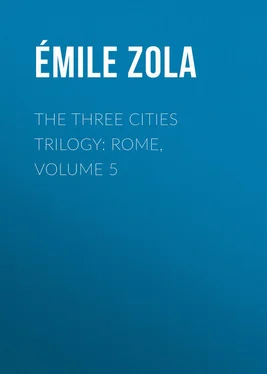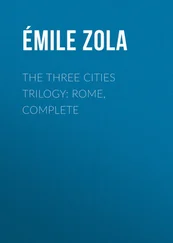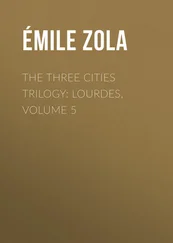Émile Zola - The Three Cities Trilogy - Rome, Volume 5
Здесь есть возможность читать онлайн «Émile Zola - The Three Cities Trilogy - Rome, Volume 5» — ознакомительный отрывок электронной книги совершенно бесплатно, а после прочтения отрывка купить полную версию. В некоторых случаях можно слушать аудио, скачать через торрент в формате fb2 и присутствует краткое содержание. Жанр: literature_19, foreign_antique, foreign_prose, на английском языке. Описание произведения, (предисловие) а так же отзывы посетителей доступны на портале библиотеки ЛибКат.
- Название:The Three Cities Trilogy: Rome, Volume 5
- Автор:
- Жанр:
- Год:неизвестен
- ISBN:нет данных
- Рейтинг книги:3 / 5. Голосов: 1
-
Избранное:Добавить в избранное
- Отзывы:
-
Ваша оценка:
- 60
- 1
- 2
- 3
- 4
- 5
The Three Cities Trilogy: Rome, Volume 5: краткое содержание, описание и аннотация
Предлагаем к чтению аннотацию, описание, краткое содержание или предисловие (зависит от того, что написал сам автор книги «The Three Cities Trilogy: Rome, Volume 5»). Если вы не нашли необходимую информацию о книге — напишите в комментариях, мы постараемся отыскать её.
The Three Cities Trilogy: Rome, Volume 5 — читать онлайн ознакомительный отрывок
Ниже представлен текст книги, разбитый по страницам. Система сохранения места последней прочитанной страницы, позволяет с удобством читать онлайн бесплатно книгу «The Three Cities Trilogy: Rome, Volume 5», без необходимости каждый раз заново искать на чём Вы остановились. Поставьте закладку, и сможете в любой момент перейти на страницу, на которой закончили чтение.
Интервал:
Закладка:
Pierre realised that the conversation was straying away from his book, but he remembered having promised the Viscount that if he should see the Pope he would make an attempt to obtain from him a decisive expression of opinion on the famous question as to whether the working-class guilds or corporations should be free or obligatory, open or closed. And the unhappy Viscount, kept in Paris by the gout, had written the young priest letter after letter on the subject, whilst his rival the Baron, availing himself of the opportunity offered by the international pilgrimage, endeavoured to wring from the Pope an approval of his own views, with which he would have returned in triumph to France. Pierre conscientiously desired to keep his promise, and so he answered: "Your Holiness knows better than any of us in which direction true wisdom lies. Monsieur de Fouras is of opinion that salvation, the solution of the labour question, lies simply in the re-establishment of the old free corporations, whilst Monsieur de la Choue desires the corporations to be obligatory, protected by the state and governed by new regulations. This last conception is certainly more in agreement with the social ideas now prevalent in France. Should your Holiness condescend to express a favourable opinion in that sense, the young French Catholic party would certainly know how to turn it to good result, by producing quite a movement of the working classes in favour of the Church."
In his quiet way Leo XIII responded: "But I cannot. Frenchmen always ask things of me which I cannot, will not do. What I will allow you to say on my behalf to Monsieur de la Choue is, that though I cannot content him I have not contented Monsieur de Fouras. He obtained from me nothing beyond the expression of my sincere good-will for the French working classes, who are so dear to me and who can do so much for the restoration of the faith. You must surely understand, however, that among you Frenchmen there are questions of detail, of mere organisation, so to say, into which I cannot possibly enter without imparting to them an importance which they do not have, and at the same time greatly discontenting some people should I please others."
As the Pope pronounced these last words he smiled a pale smile, in which the shrewd, conciliatory politician, who was determined not to allow his infallibility to be compromised in useless and risky ventures, was fully revealed. And then he drank a little more syrup and wiped his mouth with his handkerchief, like a sovereign whose Court day is over and who takes his ease, having chosen this hour of solitude and silence to chat as long as he may be so inclined.
Pierre, however, sought to bring him back to the subject of his book. "Monsieur de la Choue," said he, "has shown me so much kindness and is so anxious to know the fate reserved to my book – as if, indeed, it were his own – that I should have been very happy to convey to him an expression of your Holiness's approval."
However, the Pope continued wiping his mouth and did not reply.
"I became acquainted with the Viscount," continued Pierre, "at the residence of his Eminence Cardinal Bergerot, another great heart whose ardent charity ought to suffice to restore the faith in France."
This time the effect was immediate. "Ah! yes, Monsieur le Cardinal Bergerot!" said Leo XIII. "I read that letter of his which is printed at the beginning of your book. He was very badly inspired in writing it to you; and you, my son, acted very culpably on the day you published it. I cannot yet believe that Monsieur le Cardinal Bergerot had read some of your pages when he sent you an expression of his complete and full approval. I prefer to charge him with ignorance and thoughtlessness. How could he approve of your attacks on dogma, your revolutionary theories which tend to the complete destruction of our holy religion? If it be a fact that he had read your book, the only excuse he can invoke is sudden and inexplicable aberration. It is true that a very bad spirit prevails among a small portion of the French clergy. What are called Gallican ideas are ever sprouting up like noxious weeds; there is a malcontent Liberalism rebellious to our authority which continually hungers for free examination and sentimental adventures."
The Pope grew animated as he spoke. Italian words mingled with his hesitating French, and every now and again his full nasal voice resounded with the sonority of a brass instrument. "Monsieur le Cardinal Bergerot," he continued, "must be given to understand that we shall crush him on the day when we see in him nothing but a rebellious son. He owes the example of obedience; we shall acquaint him with our displeasure, and we hope that he will submit. Humility and charity are great virtues doubtless, and we have always taken pleasure in recognising them in him. But they must not be the refuge of a rebellious heart, for they are as nothing unless accompanied by obedience – obedience, obedience, the finest adornment of the great saints!"
Pierre listened thunderstruck, overcome. He forgot himself to think of the apostle of kindliness and tolerance upon whose head he had drawn this all-powerful anger. So Don Vigilio had spoken the truth: over and above his – Pierre's – head the denunciations of the Bishops of Evreux and Poitiers were about to fall on the man who opposed their Ultramontane policy, that worthy and gentle Cardinal Bergerot, whose heart was open to all the woes of the lowly and the poor. This filled the young priest with despair; he could accept the denunciation of the Bishop of Tarbes acting on behalf of the Fathers of the Grotto, for that only fell on himself, as a reprisal for what he had written about Lourdes; but the underhand warfare of the others exasperated him, filled him with dolorous indignation. And from that puny old man before him with the slender, scraggy neck of an aged bird, he had suddenly seen such a wrathful, formidable Master arise that he trembled. How could he have allowed himself to be deceived by appearances on entering? How could he have imagined that he was simply in presence of a poor old man, worn out by age, desirous of peace, and ready for every concession? A blast had swept through that sleepy chamber, and all his doubts and his anguish awoke once more. Ah! that Pope, how thoroughly he answered to all the accounts that he, Pierre, had heard but had refused to believe; so many people had told him in Rome that he would find Leo XIII a man of intellect rather than of sentiment, a man of the most unbounded pride, who from his very youth had nourished the supreme ambition, to such a point indeed that he had promised eventual triumph to his relatives in order that they might make the necessary sacrifices for him, while since he had occupied the pontifical throne his one will and determination had been to reign, to reign in spite of all, to be the sole absolute and omnipotent master of the world! And now here was reality arising with irresistible force and confirming everything. And yet Pierre struggled, stubbornly clutching at his dream once more.
"Oh! Holy Father," said he, "I should be grieved indeed if his Eminence should have a moment's worry on account of my unfortunate book. If I be guilty I can answer for my error, but his Eminence only obeyed the dictates of his heart and can only have transgressed by excess of love for the disinherited of the world!"
Leo XIII made no reply. He had again raised his superb eyes, those eyes of ardent life, set, as it were, in the motionless countenance of an alabaster idol; and once more he was fixedly gazing at the young priest.
And Pierre, amidst his returning feverishness, seemed to behold him growing in power and splendour, whilst behind him arose a vision of the ages, a vision of that long line of popes whom the young priest had previously evoked, the saintly and the proud ones, the warriors and the ascetics, the theologians and the diplomatists, those who had worn armour, those who had conquered by the Cross, those who had disposed of empires as of mere provinces which God had committed to their charge. And in particular Pierre beheld the great Gregory, the conqueror and founder, and Sixtus V, the negotiator and politician, who had first foreseen the eventual victory of the papacy over all the vanquished monarchies. Ah! what a throng of magnificent princes, of sovereign masters with powerful brains and arms, there was behind that pale, motionless, old man! What an accumulation of inexhaustible determination, stubborn genius, and boundless domination! The whole history of human ambition, the whole effort of the ages to subject the nations to the pride of one man, the greatest force that has ever conquered, exploited, and fashioned mankind in the name of its happiness! And even now, when territorial sovereignty had come to an end, how great was the spiritual sovereignty of that pale and slender old man, in whose presence women fainted, as if overcome by the divine splendour radiating from his person. Not only did all the resounding glories, the masterful triumphs of history spread out behind him, but heaven opened, the very spheres beyond life shone out in their dazzling mystery. He – the Pope – stood at the portals of heaven, holding the keys and opening those portals to human souls; all the ancient symbolism was revived, freed at last from the stains of royalty here below.
Читать дальшеИнтервал:
Закладка:
Похожие книги на «The Three Cities Trilogy: Rome, Volume 5»
Представляем Вашему вниманию похожие книги на «The Three Cities Trilogy: Rome, Volume 5» списком для выбора. Мы отобрали схожую по названию и смыслу литературу в надежде предоставить читателям больше вариантов отыскать новые, интересные, ещё непрочитанные произведения.
Обсуждение, отзывы о книге «The Three Cities Trilogy: Rome, Volume 5» и просто собственные мнения читателей. Оставьте ваши комментарии, напишите, что Вы думаете о произведении, его смысле или главных героях. Укажите что конкретно понравилось, а что нет, и почему Вы так считаете.












